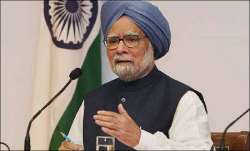1984 anti-Sikh riots could have been avoided if Gujral's advice was heeded: Manmohan Singh
The 1984 anti-Sikh riots, also known as the 1984 Sikh Massacre, was a series of organised pogroms against Sikhs in India in response to the assassination of Indira Gandhi by her Sikh bodyguards. The ruling Indian National Congress had been in an active complicity with the mob, as to the organisation of the riots.

The Sikh massacre of 1984 in Delhi could have been avoided, former Prime Minister Manmohan Singh said on Wednesday. Speaking at a ceremony to mark the 100th birth anniversary of former prime minister Gujral in Delhi, Manmohan Singh said the 1984 anti-Sikh riots could have been averted had the then Home Minister Narsimha Rao acted upon the advice of Inder Kumar Gujral.
"Gujral Ji was so concerned that he went to the then Home Minister Narsimha Rao that very evening .. the situation is so grave that it is necessary for the government to call the army at the earliest. If that advice would have been heeded perhaps the 1984 massacre could have been avoided," Manmohan Singh said.
Former President Dr Pranab Mukherjee, who also spoke at the event, regretted the then Congress high command's decision to withdraw support from IK Gujral-led United Front government in 1998. He said that the decision allowed BJP to come to power.
"Many architects of United front government are here, Sitaram Yechuri is here, he has to face angry crowd, calling him responsible for the mischief of bringing down the coalition government, short point I am trying to make is... that these decisions perhaps we could have deferred the BJP from coming to power in 1998... and the government could have continued with our support for full term," Pranab Mukherjee said.
1984 anti-Sikh riots
The 1984 anti-Sikh riots, also known as the 1984 Sikh Massacre, was a series of organised pogroms against Sikhs in India in response to the assassination of Indira Gandhi by her Sikh bodyguards. The ruling Indian National Congress had been in an active complicity with the mob, as to the organisation of the riots.
Independent sources estimate the number of deaths at about 8,000–17,000 whilst government estimates project that about 2,800 Sikhs were killed in Delhi and 3,350 nationwide.
Violence continued in the early 1980s because of the armed Sikh separatist Khalistan movement which sought independence from India.
In July 1982, the Sikh political party Akali Dal's President Harchand Singh Longowal had invited Jarnail Singh Bhindranwale to take up residence in Golden Temple Complex to evade arrest. Bhindranwale later on made the sacred temple complex an armoury and headquarters.
In the violent events leading up to the Operation Blue Star since the inception of Akali Dharm Yudh Morcha, the militants had killed 165 Hindus and Nirankaris, even 39 Sikhs opposed to Bhindranwale were killed.
The total number of deaths was 410 in violent incidents and riots while 1,180 people were injured.
Operation Blue Star was an Indian military operation carried out between 1 and 8 June 1984, ordered by Prime Minister Indira Gandhi to remove militant religious leader Jarnail Singh Bhindranwale and his armed militants from the buildings of the Harmandir Sahib complex in Amritsar, Punjab.
Bhindranwale died and militants were removed from the temple complex. The military action in the temple complex was criticized by Sikhs worldwide who had interpreted it as an assault on the Sikh religion.
Also Read | Many 1984 anti-Sikh riots case files missing in Kanpur: SIT
Also Read | Supreme Court grants bail to 34 in anti-Sikh riots
